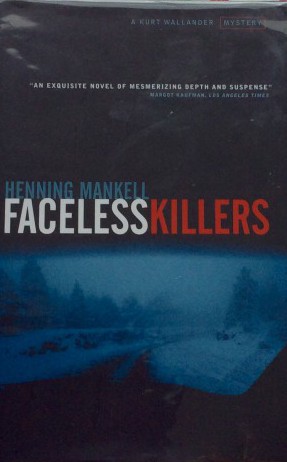Inspiring Older Readers
 posted on 21 Aug 2016
posted on 21 Aug 2016
Faceless Killers by Henning Mankell
I am a big fan of detective novels including some that are often described as 'Scandinavian noir '. I'm not quite sure why they are so popular because they are often unremittingly bleak and packed full of grim yet resilient protagonists. I suppose the appeal might be to do with being set in a landscape that is certainly foreign but reassuringly familiar where the weather is usually grey and cold?
I have read lots of novels by the Swedish master of this genre, Henning Mankell and looked forward to reading this one which is the first in the Inspector Kurt Wallander series. Although I have never read this book before, I have seen it in two different Swedish TV adaptions and the more recent BBC version starring Kenneth Branagh. Although all were reasonably faithful to the original, none of them came even close to painting that feeling of impending dread that the imagination helps to build when reading.
It is always difficult to know how faithful a translation is to the original text but this writing seems sparsely elegant. I have never noticed the rather staccato style before in his other novels because I have been avidly following the often complex plot. However, the characteristic short sentences convey a brisk efficiency and so also contribute to the tense atmosphere.
The opening few pages are magnificent as we share the feeling of unease when the elderly farmer who lives with his wife in the remote countryside wakes up suddenly in the middle of the night to a threatening and overwhelming stillness. First he checks that his wife is still breathing beside him and then he goes to investigate further. At this point I wonder how many other readers are silently shouting ' no please don't do that!' as he then decides to go into his nearby neighbour's house because he is concerned about a broken window. And why isn't the light on? And why isn't their horse making its usual noise? He eventually discovers a truly ghastly scene of torture and murder inside their house which is all the more powerful because it is so understated. At this point he sensibly phones for the police and along comes Wallander and his crew to try to make sense of the mystery.
To some extent, Kurt Wallander conforms to the archetypal disillusioned, anti- social, lonely middle aged detective of modern crime fiction, or perhaps he contributed to the construction of such a character? I wonder if anyone has thought of writing a crime novel where some of these well- known rather grumpy personalities get together to solve a crime? At a superficial level, he might fit in well with the likes of DCI Banks, Rebus and Jack Frost with his maverick approach to police procedure and a disdain for pompous authority. Like them he also has a fairly disastrous personal life and a penchant for strong drink and unhealthy eating. Temperamentally he is probably most like Inspector Morse (he even likes opera) but he is somehow more human and full of self- doubt, which I like very much.
Henning Mankell was a renowned campaigner and human rights activist and was involved in a range of other social projects, particularly in Africa and this is interesting with respect to the subject of refugees in this novel. A nearby camp is attacked and a Somali man is brutally killed when there is a hint that foreigners may be responsible for the original murder. Wallander reflects several times on how Swedish society is changing and tries to articulate the reasons behind the rise of the right as part of this. For instance, he is very frustrated at the inefficiency of the immigration service that doesn't seem to be in control of borders. When he was interviewed in The Guardian in 2011as the last book in the series was published, he explained that this concern after returning to Sweden after a long period living in Africa was the impetus for writing the first novel in 1991:
"I sensed there was something happening, a danger of racism, xenophobia. And since those would be criminal acts, I realised I needed to write a crime novel. And since it was a crime novel, it needed a policeman. I took his name from the phone book. But the impulse, the inspiration, was always the question: the issue at hand. Not the character"
From reading the later novels, I know that Wallander gradually develops a different perspective that is perhaps more in tune with Mankell's own world view. I can’t help wondering how he might continue to reflect the current refugee crisis and consequent negative reactions. On the other hand, Mankell stated in the same interview that although the character resembled him in some respects, ‘he wouldn't be a close friend. He's not someone I'd invite to dinner.’
The review on the cover of the book by Margot Kaufman of the Los Angeles Times promises 'An exquisite novel of mesmerising depth and suspense ' and I could not put it better myself. So is it worth re reading at some stage? I am certainly not intending to re- read any of the Inspector Morse series because the TV adaptations are sufficient. But yes, I am really looking forward to setting some time aside one day to re- read the Wallander series in chronological order and to relish how the character changes and grows. I'm just sorry that his untimely death in 2015 means there won't be any more of these or other engaging novels from such a powerful writer.
Karen Argent
August 2016